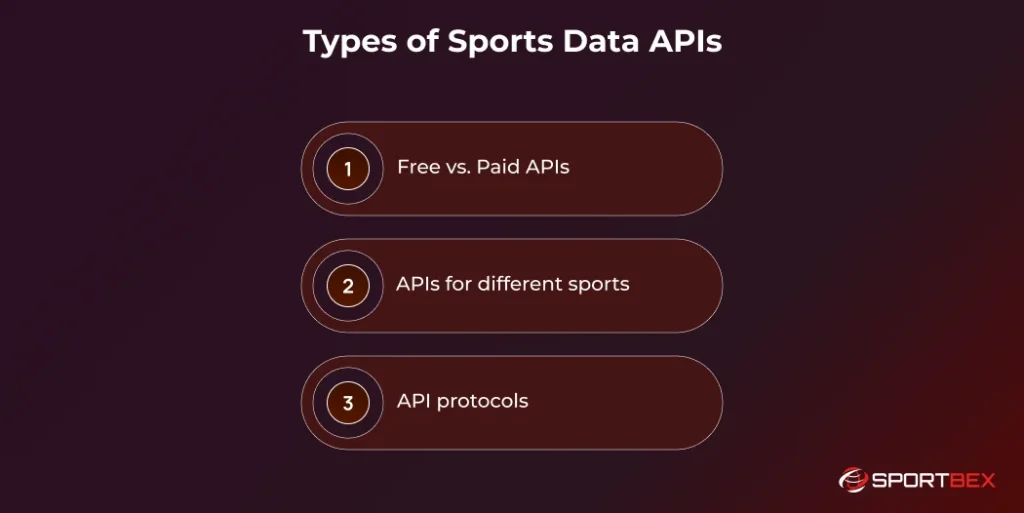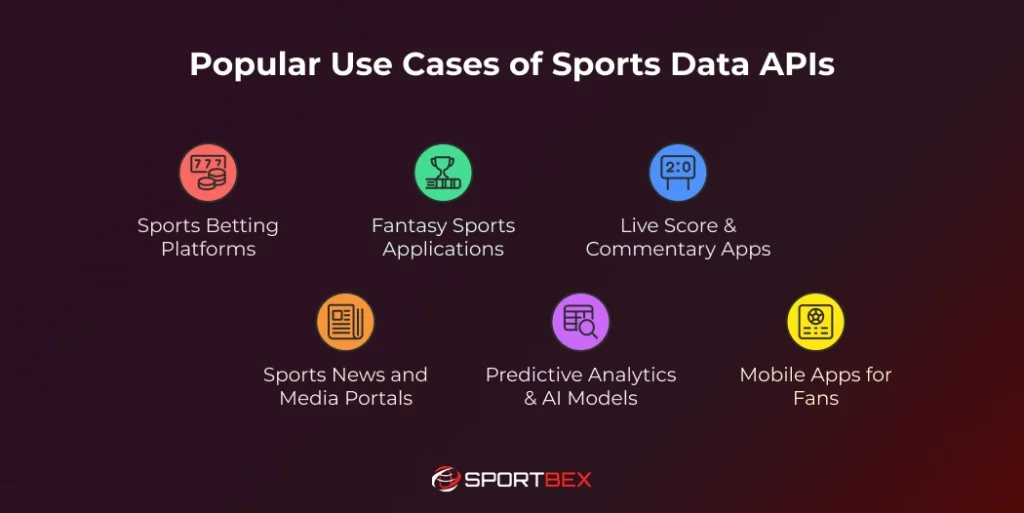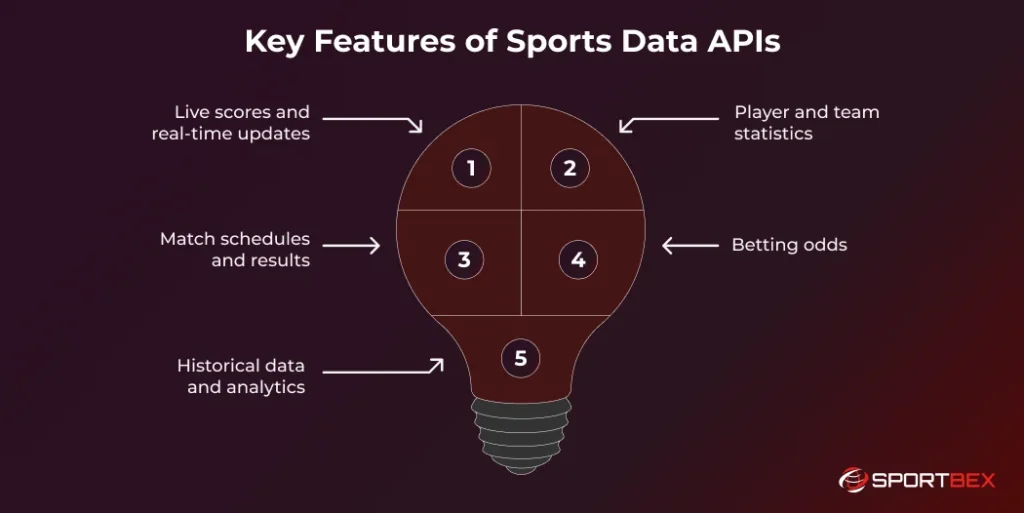In today’s fast-paced digital world, sports fans have come to expect instant access to information. They crave up-to-the-minute scores, correct stats, and fun, interactive ways to engage with their favorite sports apps and websites.
Imagine you’re managing your fantasy football team, placing a bet on a live game, or simply trying to catch the latest headlines on a sports news site, all these experiences depend on a constant stream of fresh data.
These platforms rely on something called sports data APIs. In simple terms, these APIs are what allow them to access and display the newest information quickly and, most importantly, correctly.
A Sports Data API lets developers access sports information like live scores, player stats, match schedules, and betting odds. By adding a sports data feeds to apps or websites, developers can make them more engaging, offer useful insights, and create features like live analytics or real-time betting tools.
This guide will explain What Is a Sports Data API? Guide for Beginners, its types, features, use cases, and future trends. It will also provide insights into choosing the right sports data provider for your project, making it the ultimate beginner’s guide to understanding and using sports APIs.ed for manual data collection and processing.
What is a Sports Data API?
A Sports Data API is a tool that lets developers add sports information to their apps or websites. An API, or Application Programming Interface, works like a bridge. It connects your app to a data source, allowing them to talk to each other and get live updates.
Essentially, A sports API makes it easy to get information like scores, stats, schedules, or betting odds for your platform without having to gather it manually. With a sports trading API or a sports data service, businesses can provide users with accurate, up-to-date content to boost engagement and help them make better decisions.
APIs can be customized based on the type of sport, regions, or types of data, making them useful for many purposes. A good sports data provider gives reliable data, works consistently, and covers a variety of sports, which is important for professional platforms.
Types of Sports Data APIs

Sports data APIs differ in the information they offer and how you can use them. Here are the main types:
A robust sport data API can do many of these things at once! It offers a full sports API solution for different businesses.
- Live Scores API: Delivers real-time scores and updates for ongoing matches.
- Statistics API: Provides detailed player and team stats, historical performance, and analytics.
- Schedule and Results API: Gives information on fixtures, past results, and tournament timelines.
- Betting Odds API: Supplies odds from multiple sportsbooks, useful for betting apps.
- Fantasy Sports API: Tailored for fantasy leagues, offering player stats, projections, and scoring updates.
A robust sport data API can do many of these things at once! It offers a full sports API solution for different businesses.
1. Free vs. Paid APIs
- Free APIs offer basic sports information that’s great for smaller projects, learning, or just trying things out. They often come with limitations, like fewer features, slower data updates, or a cap on how many times you can request information each day.
- Paid APIs provide more features, real-time sports updates, better reliability, and wide coverage of different leagues and sports. They’re perfect for professional apps, betting sites, and fantasy sports platforms.
2. APIs for Different Sports
Different sports need different types of data, so sports data providers usually focus on specific sports. Popular sports they cover include:
- Football (Soccer): Live scores, player stats, league standings.
- Basketball: Game statistics, player efficiency ratings, schedules.
- Baseball: Pitch-by-pitch data, player stats, historical analytics.
- Tennis: Match scores, player rankings, tournament schedules.
- Esports: Player stats, match outcomes, live tournament feeds.
This specialization lets developers get highly detailed data, like player performance metrics, team stats, and match histories.
3. API Protocols
Most sports API solutions use modern technology to quickly and efficiently deliver data. By choosing to use a Sports Data API, developers can seamlessly integrate live scores, player statistics, betting odds, and historical analytics.
- EST API: Common and easy to integrate, uses standard HTTP requests.
- WebSocket API: Ideal for real-time updates like live scores or betting odds.
- GraphQL: Offers flexibility to request only specific data fields, reducing bandwidth.
Selecting the right protocol is essential and largely depends on the specific speed requirements and overall architecture of your application.
Popular Use Cases of Sports Data APIs

Sports APIs have changed the way fans engage with sports. Here are some popular ways they are used:
Fantasy Sports Platforms
Fantasy sports platforms use a fantasy sports data API to offer a dynamic user experience. They can provide live player stats, real-time scoring updates, and future game projections.
This constant flow of information creates an engaging, competitive environment where users can make informed decisions and stay connected to the action.
Online Sportsbooks and Betting Apps
A sports odds API provides access to real-time odds, match outcomes, and various betting markets, offering a reliable way to keep up with the sports betting world.
By delivering accurate, timely data, these APIs help ensure fair betting opportunities and enhance the user experience. Whether tracking live odds for a major football match or accessing betting markets for niche sports, a sports odds API is essential for casual bettors and industry professionals alike.
Sports News Websites and Mobile Apps
Integrating a sports data feed enables news sites to provide their audience with real-time updates, in-depth game highlights, and detailed sports app statistics.
This ensures that viewers stay informed about the latest developments as they happen, whether it’s tracking live scores during a match or analyzing player performance through comprehensive stats.
Analytics Dashboards
Sports analysts depend on sports data integration to create powerful analytics dashboards. These tools allow them to visualize complex information, such as team performance metrics, individual player efficiency ratings, and emerging market trends.
By transforming raw data into clear visual charts and graphs, analysts can gain deeper insights, which in turn helps teams with their strategic planning, player scouting, and overall decision-making processes.
Fan Engagement Tools
Apps and platforms can take advantage of sports data feeds API to develop interactive features like quizzes, live polls, and predictive games that keep fans actively engaged throughout matches.
For example, a live poll could let fans vote on the next big play, while predictive games might challenge users to guess the final score or key stats. These features not only enhance the viewing experience but also create opportunities for deeper fan interaction and loyalty during live events.
Key Features of Sports Data APIs

A high-quality sports data API offered by reliable Sports Data API Providers offers a range of robust features designed to enhance the functionality and user experience of any sports-related application.
Live Scores and Real-Time Updates
Instant updates are absolutely critical for keeping users engaged and hooked on your platform. Think about the excitement of a live game, whether it’s a breathtaking goal in football or a nail-biting, last-minute basketball shot, your audience wants to experience that moment as it happens.
Providing real-time sports data ensures that your users stay informed and deeply invested in the action, making them feel like they’re right there in the stadium.
Player and Team Statistics
Detailed player performance metrics, team rankings, and other advanced stats are what allow for truly deep and meaningful analytics. These features go beyond simple scores, offering a comprehensive look at individual and team performance.
They are especially vital for applications like fantasy sports platforms, where users rely on detailed player statistics to build their dream teams.
Match Schedules and Results
Access to up-to-date fixtures, complete tournament timelines, and a comprehensive archive of historical results is absolutely essential. This kind of information allows users to plan their viewing schedules.
Follow the progress of their favorite teams throughout a season, and look back at past performances, which all work together to significantly enhance overall user engagement and keep them coming back to the platform
Betting Odds
A sports trading API or sports odds API is truly a game-changer! It’s an incredible tool that delivers all the most up-to-date betting information, right at your fingertips.
Imagine having real-time data that empowers sportsbooks to set their lines with precision, helps betting apps offer competitive odds, and allows analysts to make incredibly informed decisions.
Historical Data and Analytics
Analyzing past performance, observing trends, and leveraging detailed analytics provide a solid foundation for gaining deeper insights. These insights can significantly enhance predictive modeling, improve fantasy scoring accuracy, and support more effective strategic planning.
By studying historical data and patterns, it becomes easier to anticipate future outcomes, make informed decisions, and refine overall strategies for better results.
Future Trends in Sports Data API
The future of sports data APIs is set to transform how fans, analysts, and businesses interact with sports information. Advancements in AI and predictive analytics will enable platforms to forecast match outcomes and player performance using historical data, enhancing decision-making for fantasy sports and betting. Real-Time Sports Data and interactive features will drive enhanced fan engagement, keeping audiences connected during live events.
Additionally, the rise of esports will expand API coverage, providing detailed competitive gaming statistics. Blockchain integration will ensure data authenticity and secure transactions, while global expansion will bring more leagues and tournaments into feeds, giving businesses leveraging sports API solutions a significant competitive advantage.
Get a Ready-Made Platform On Rent.
Get Started Today
Conclusion
Understanding what a sports data API is and how it works is crucial for anyone developing sports-related applications. These APIs provide access to live scores, player statistics, betting odds, and historical analytics, enabling developers to create dynamic and engaging platforms.
Selecting the right sports data provider and effectively integrating a sports data feeds API can significantly improve user experience, increase engagement, and boost overall business performance. As the sports industry continues to grow, sports data integration will evolve, offering more real-time insights, predictive analytics, and interactive experiences for fans.
Leveraging a sports API solution has become essential for the success of fantasy sports platforms, sportsbooks, and sports news applications.
Frequently Asked Questions
A sports data API allows apps, websites, and platforms to access real-time scores, player statistics, match schedules, betting odds, and historical data efficiently.
Some APIs offer limited free access for testing or small-scale projects, but commercial platforms usually require paid plans for reliability, speed, and extensive data coverage.
Most APIs support popular sports like football, basketball, baseball, tennis, and esports, with many providers expanding to niche leagues and tournaments.
While both provide sports-related data, a sports trading API focuses specifically on betting odds and trading markets, whereas a sports data API covers broader statistics, scores, and analytics.
Integration depends on the API protocol. REST APIs are most common, WebSockets are used for live updates, and GraphQL allows flexible data queries. Proper integration ensures smooth sports data integration into your platform.
Recent Blog
Which Real-Time Sports Data API Offers the Fastest Live Updates?
January 23, 2026
 9 min
9 min
How Does a Live Odds Provider Deliver Real-Time Betting Data
January 23, 2026
 7 min
7 min






